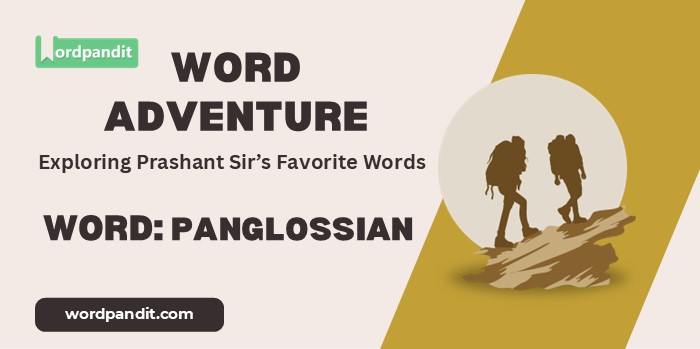Word Adventure: Panglossian
The Headline
“Panglossian: When Optimism Meets Philosophy in the Best of All Possible Words”
The Scoop
In the realm of literary-inspired vocabulary, some words carry not just meaning but entire philosophical worldviews. ‘Panglossian’ is one such term – a word born from satire that has come to represent both the power and potential pitfalls of extreme optimism. Let’s explore this thought-provoking word that challenges us to consider the nature of optimism itself.
Let’s Break It Down
The Plot Thickens
‘Panglossian’ derives from Dr. Pangloss, the eternally optimistic mentor in Voltaire’s masterpiece “Candide.” The character’s name itself is meaningful: ‘pan’ (all) + ‘glossa’ (tongue/language), suggesting someone who talks about everything – particularly about how everything is for the best.
Voltaire created Dr. Pangloss to satirize Gottfried Leibniz’s philosophy that we live in “the best of all possible worlds.” Through this character’s absurdly maintained optimism in the face of war, disease, and natural disasters, Voltaire critiqued the danger of blind optimism that ignores real problems.
Today, ‘Panglossian’ serves as a sophisticated way to describe optimism that crosses into willful denial – though it can also be used more gently to describe someone whose positive outlook persists against all odds.
Word in the Wild
The Twist
Here’s an intriguing irony: while ‘Panglossian’ was coined to criticize blind optimism, some research suggests that a degree of “unrealistic optimism” might actually be beneficial for mental health and achievement. This raises a fascinating question: at what point does a Panglossian outlook shift from being a psychological asset to a liability? Perhaps the answer lies in maintaining hope while still acknowledging and addressing life’s real challenges.
Make It Stick
Panglossian: When your rose-colored glasses are permanently glued to your face!
Your Turn
Think about the role of optimism in your own life. Have you encountered Panglossian personalities? How do you balance maintaining a positive outlook with facing reality? Share your experiences with optimism – both helpful and excessive – in the comments below. Let’s explore the fine line between hope and denial!
Down the Rabbit Hole
- Curious about philosophical optimism? Explore Leibniz’s writings and Voltaire’s satirical response in “Candide”.
- Interested in the psychology of optimism? Research studies on positive thinking, resilience, and mental health.
- Want to discover more literary-inspired words? Look into terms like ‘Quixotic’, ‘Kafkaesque’, and ‘Orwellian’.
The Last Word
As we conclude our exploration of ‘Panglossian’, I hope you’ve gained appreciation for this word that challenges us to think about the nature and limits of optimism. While excessive optimism might deserve Voltaire’s satire, perhaps there’s wisdom in finding a balance between hope and realism. Until our next word adventure, this is Prashant from Wordpandit, encouraging you to keep your outlook bright – but your eyes wide open!











